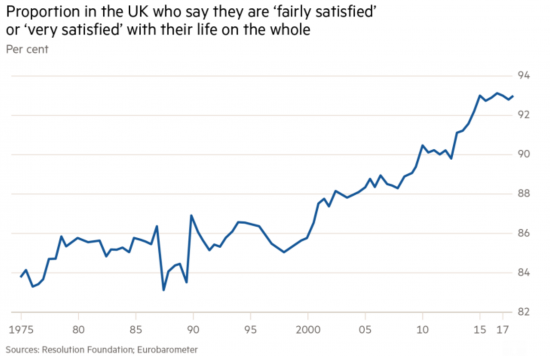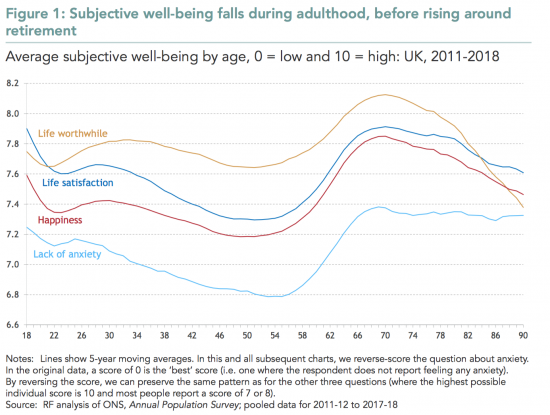The FT featured work originally produced by the Resolution Foundation on well-being this week. It found this slightly surprising trend:
 Apparently we are happier now, on average, than we have just about ever been.
Apparently we are happier now, on average, than we have just about ever been.
That's not all of us, of course. Well-being varies with age:
 Of course the moral of that one is easy to find: having children might well explain the trend.
Of course the moral of that one is easy to find: having children might well explain the trend.
It is also true that being in a stable relationship, having higher income, your own home and good health all help generate well being. There's not much surprise there. Nor is there any surprise in the fact that marginal increases in well being resulting from an increase in income decline markedly as earnings rise. But overall the finding looks surprising. Not least because the generation that hates the EU the most (those more elderly in the population) do, for example, appear remarkably happy with their lot. That must be the result, at least in part, from being in the EU. So I looked at the questions asked to underpin this finding. I recognise that the Resolution Foundation use four datasets, but the survey appears dominated by ONS data. They ask just four questions:
- Overall, how satisfied are you with your life nowadays?
- Overall, to what extent do you feel the things you do in your life are worthwhile?
- Overall, how happy did you feel yesterday?
- Overall, how anxious did you feel yesterday?
The bias within the questions should, I hope, be obvious. Those proposing mindfulness should be happy. What the survey ask is ‘are you happy now?'
And I have to say that most of the time I can say ‘yes' to that. I have teenage children with exam stress, uncertainty about my own employment / funding, a wife whose health is a cause for concern, and beyond my family a range of issues that some might have noticed cause me considerable concern. But if you ask me right now, most of the time I am happy. Because in the short term there's food on our table, bills are under control, we have a roof over our head and much to laugh about - which happens quite a lot around here - and things to do that appeal to me.
So was the survey of well-being very useful? At one level I can very obviously question that. It might be that all that it shows is that if you ask this question more directly and more often (and both are happening) in a society where, I think, it is becoming easier to express emotion publicly, this is the finding you might expect to get. Correct for those factors and we might be no happier, although I stress, I cannot know for sure (and nor can those doing the survey).
But I don't want to be a cynic. I would like us to be happier. Who wouldn't? But I have real doubts. I think that this survey does not reflect long term concerns well enough, and even if some additional data did include measures of mental ill health I do not think them sufficient either: you can worry about our future without having mental ill health. I think the lesson is that the ONS really do need to look rather more deeply about the future when asking their questions. Wellbeing is not all about now. And work in this area should reflect that fact or false impressions are given.
Thanks for reading this post.
You can share this post on social media of your choice by clicking these icons:
You can subscribe to this blog's daily email here.
And if you would like to support this blog you can, here:



This is an excellent analysis of the statistics – I would be suspicious that the questions were designed specifically for the production of headlines beneficial to the current government, even.
I’m very sceptical about this, truth be told – in an age (for example) of self delusion where heavily indebted people think they are – well – rich? Having that large house, having the new Audi – the having of things seems to make us happy to the point where underlying debt is now ignored or even just a fact of life.
Or is the British ‘Carry On’ attitude when things are shit?
All I hear about is that everyone is having problems with our health service from dentistry to mental health services.
I’m sorry ONS but I don’t believe it. Not one bit.
I admit I tend to agree
But as I say, I think the questions are wrong
This survey’s results surprise me too, but I’m no sociologist.
The almost constant rise in overall satisfaction shown in the first graph especially is difficult to analyse and comprehend, the questions asked are a very blunt instrument indeed.
The second graph is more telling but not surprising.
The sharp drop in satisfaction when you first hit the real world and have to make your way through the complexities of the world of work and relationships without a safety net is telling.
So is the sharp rise in satisfaction once you reach the end of your working career, mortgage repayments, child rearing responsibilities. (It hit me too, this ‘freedom at last!’ moment).
Then from your mid-seventies, mostly with health problems dominating I suspect, as well as mental health issues as you lose friends and partners around you and become more lonely and dependent, life loses its attraction.
I guess this second graph would remain pretty constant throughout the decades.
If it helps society to try and provide better targeted support to people around the times they most need it, good.